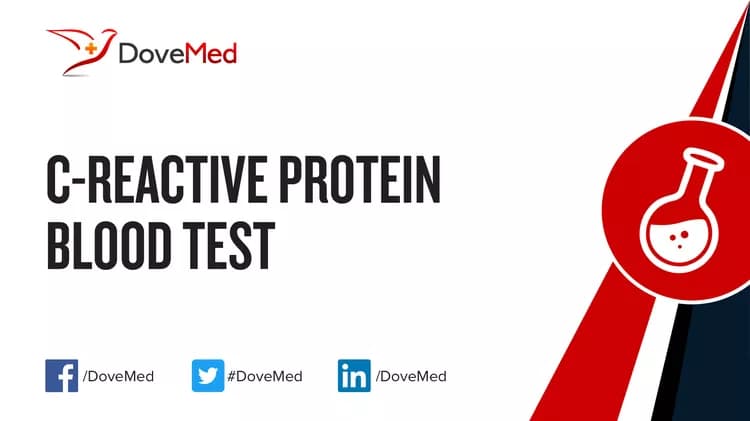What are the other Names for this Test? (Equivalent Terms)
- CRP (C-Reactive Protein) Blood Test
- High-Sensitivity C-Reactive Protein Blood Test
- Ultra-Sensitive C-Reactive Protein Blood Test
What is C-Reactive Protein Blood Test? (Background Information)
- C-Reactive Protein (CRP) Blood Test measures a type of protein that binds with a sugar called C-polysaccharide, which is usually found in bacterial cell wall
- CRP is produced in liver as an immediate response to harmful stimuli, such as pathogens. As a result, during infection, CRP concentration increases rapidly in blood
- Blood CRP concentration quickly responds to medical interventions too. Therefore, the CRP Test is done to assess disease progression and also to check the effectiveness of specific treatments
- CRP can be measured by several methods such as ELISA (enzyme-linked immuno-sorbent assay), Turbidimetry, and Nephlometry
- High-Sensitivity CRP or Ultra-Sensitive CRP Blood Test has the capability to detect even very low concentrations of CRP in blood. Such CRP tests are used in-conjunction with other tests, like lipid profile, to predict an individual’s risk of developing cardiovascular diseases
What are the Clinical Indications for performing the C-Reactive Protein Blood Test?
Following are the clinical indications for performing a C-Reactive Protein Blood Test:
- Post-surgical infection
- Risk assessment for cardiovascular diseases
- Lymph nodes cancer
- Intestinal bleeding and swelling
- Immune system disorders
- Infection involving bones
- Effectiveness of a treatment or progression of a disease
How is the Specimen Collected for C-Reactive Protein Blood Test?
Following is the specimen collection process for C-Reactive Protein Blood Test:
Sample required: Blood/heparinized plasma/serum
Process of obtaining blood sample in adults:
- A band is wrapped around the arm, 3-4 inches above the collection site (superficial vein that lies within the elbow pit)
- The site is cleaned with 70% alcohol in an outward spiral, away from the zone of needle insertion
- The needle cap is removed and is held in line with the vein, pulling the skin tight
- With a small and quick thrust, the vein is penetrated using the needle
- The required amount of blood sample is collected by pulling the plunger of the syringe out slowly
- The wrap band is removed, gauze is placed on the collection site, and the needle is removed
- The blood is immediately transferred into the blood container, which has the appropriate preservative/clot activator/anti-coagulant
- The syringe and the needle are disposed into the appropriate “sharp container” for safe and hygienic disposal
Preparation required: No special preparation is needed prior to the test.
What is the Significance of the C-Reactive Protein Blood Test Result?
The significance of the C-Reactive Protein Blood Test is explained:
- CRP is useful to monitor certain disease conditions, like rheumatoid arthritis, infections, or cancer
- The American Heart Association (AHA) and US Centers for Disease Control and Prevention (CDC) have made several recommendations concerning the use of CRP Blood Test in cardiovascular risk assessment. The measurements indicate:
- <1.0 mg/dL indicates a relatively low risk
- 1.0-3.0 mg/dL indicates average risk
- >3.0 mg/dL indicates high risk
- Individuals with higher Hs-CRP concentrations are more likely to develop myocardial infarction and peripheral vascular diseases
The laboratory test results are NOT to be interpreted as results of a "stand-alone" test. The test results have to be interpreted after correlating with suitable clinical findings and additional supplemental tests/information. Your healthcare providers will explain the meaning of your tests results, based on the overall clinical scenario.
Additional and Relevant Useful Information:
- High CRP results should not be used alone, but interpreted along with complete clinical history and other tests
- CRP should not be performed for any risk assessment, when the individuals have infections and trauma
- CRP is non-specific and has limited clinical utility
- Individuals with persistently higher CRP results above 10mg/dL should always be evaluated for non-cardiovascular causes
- National Institute of Health and Clinical Excellence, UK, has published some guidelines on the use of pre-operative testing of CRP for non-emergency (elective) surgery. The guidelines do not recommend CRP Testing on patients admitted for elective surgery
Certain medications that you may be currently taking may influence the outcome of the test. Hence, it is important to inform your healthcare provider of the complete list of medications (including any herbal supplements) you are currently taking. This will help the healthcare provider interpret your test results more accurately and avoid unnecessary chances of a misdiagnosis.
Related Articles
Test Your Knowledge
Asked by users
Related Centers
Related Specialties
Related Physicians
Related Procedures
Related Resources
Join DoveHubs
and connect with fellow professionals


0 Comments
Please log in to post a comment.